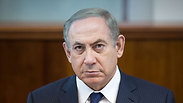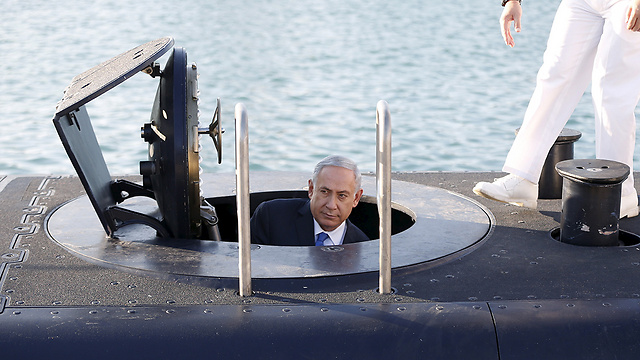
Prime Minister Benjamin Netanyahu. Profound questions raised by his conduct in the submarine affair
Photo: Emil Salman

Netanyahu and the German submarines: The unanswered questions
Analysis: Why was the prime minister so eager to finalize such an expensive submarine deal with Germany, which would only be implemented at least 10 years later? And why did he ignore all professional elements and make the decision on his own?
The affair involving the purchase
of three additional submarines from Germany raises profound questions about the conduct of Prime Minister Benjamin Netanyahu and his people. It’s safe to assume that if an investigation is ever launched into the matter, former Defense Minister Moshe Ya’alon would be happy to provide a testimony.
According to sources in the Defense Ministry and in the IDF, the first time the defense establishment found out that the prime minister planned to purchase three additional submarines for the Navy was in the second half of 2015. During that period, the defense establishment and the National Security Council (NSC) were in the midst of discussions on the components of the multi-year “Gideon” work plan.
The plan, which was submitted by the IDF at the time, included a recommendation to remove one Dolphin-class submarine from the order of battle after the arrival of a new submarine – the last one in the current deal with Germany – in 2019. The memo submitted by then-NSC head Yossi Cohen, today’s Mossad director, reveals that the prime minister instructed the NSC and the defense establishment to purchase three additional submarines. In other words, to increase the IDF’s submarine fleet to nine submarines.
But then-Defense Minister Moshe Ya’alon rejected the idea out of hand, which sparked a heated argument with the prime minister on the purchase of the additional submarines. The prime minister, meanwhile, reprimanded the defense establishment over its intention to remove a submarine from the order of battle. At the same stage, Ya’alon and the IDF looked into the possibility that one of the bodies relevant to the “Gideon” plan had innocently worked with the NSC and provided a positive professional opinion on the purchase of the additional submarines.
The issue was examined in the chief of staff’s office, in the Navy headquarters and in the Planning Directorate. No one in each of these three offices had a clue about the new submarine deal, and no one had been asked to present an opinion, a plan or a military demand.
The defense minister managed to convince the prime minister that since the deal would not be implemented in the following five years, Netanyahu would reach an agreement in principle with the Germans regarding the possibility to purchase three submarines in the future to replace submarines that would go out of service. The defense minister further clarified that it was impossible to predict the Navy’s needs and technologies in another decade. Therefore, Israel and Germany should sign a memorandum of understanding in principle, without going into detail.
In mid-February 2016, on the eve of Netanyahu’s visit to Germany, the defense minister’s office incidentally learned that the prime minister was planning to sign the purchase of three additional submarines during the visit and finalize a concrete timetable. That was also done without consulting the Defense Ministry or the IDF. The prime minister did not take with him any memo on the type of submarines or the extent of armament.
This led to another serious conflict between Ya’alon and Netanyahu, with the prime minister arguing that German Chancellor Angela Merkel could lose the elections and then Israel might not be able to receive thee more submarines from Germany at such an attractive price. At the end of the argument, the prime minister left for Germany and only signed a memorandum of understandings, as he had agreed to previously. In the document, the Germans pledged to sell the submarines for a special price, and Israel promised to buy them.
From that moment, the relationship between the defense minister and prime minister began deteriorating. It was aggravated by ethical disputes over the issue of backing IDF officers and the Elor Azaria affair. Three months later, Netanyahu’s conduct finally prompted Ya’alon to resign.
The ties between the Prime Minister’s Office and the German shipyard in Kiel first raised suspicions about three years ago, when the Defense Ministry issued an international bid for the construction of four vessels to defend the oil rigs. The prime minister insisted on signing the deal in Germany, claiming that the Germans were giving Israel a discount. But the Defense Ministry had a problem with the German shipyard, which they said had raised the price first and then given reductions. Netanyahu’s pressure eventually worked, and the deal was finalized.
Why was Netanyahu so eager to finalize a submarine deal with Germany, which would only be implemented in at least 10 years? Why did the prime minister ignore all the professional elements – the Navy, the Planning Directorate and the Defense Ministry – and make a decision on his own to force the state to purchase the most expensive weapon Israel has ever purchased? Why did he hide his intention to sign the submarine purchase deal during his visit to Germany from the defense establishment? And why did he insist on calling off the international bid for the purchase of vessels to protect the oil rigs, while insisting on signing the other deal with the German shipyard?
The prime minister and NSC say the need to purchase three additional submarines was worked out in great detail. But no such work was carried out in the IDF, in the Navy or in the Planning Directorate. If such work was done anywhere, it was only in the NSC.

















